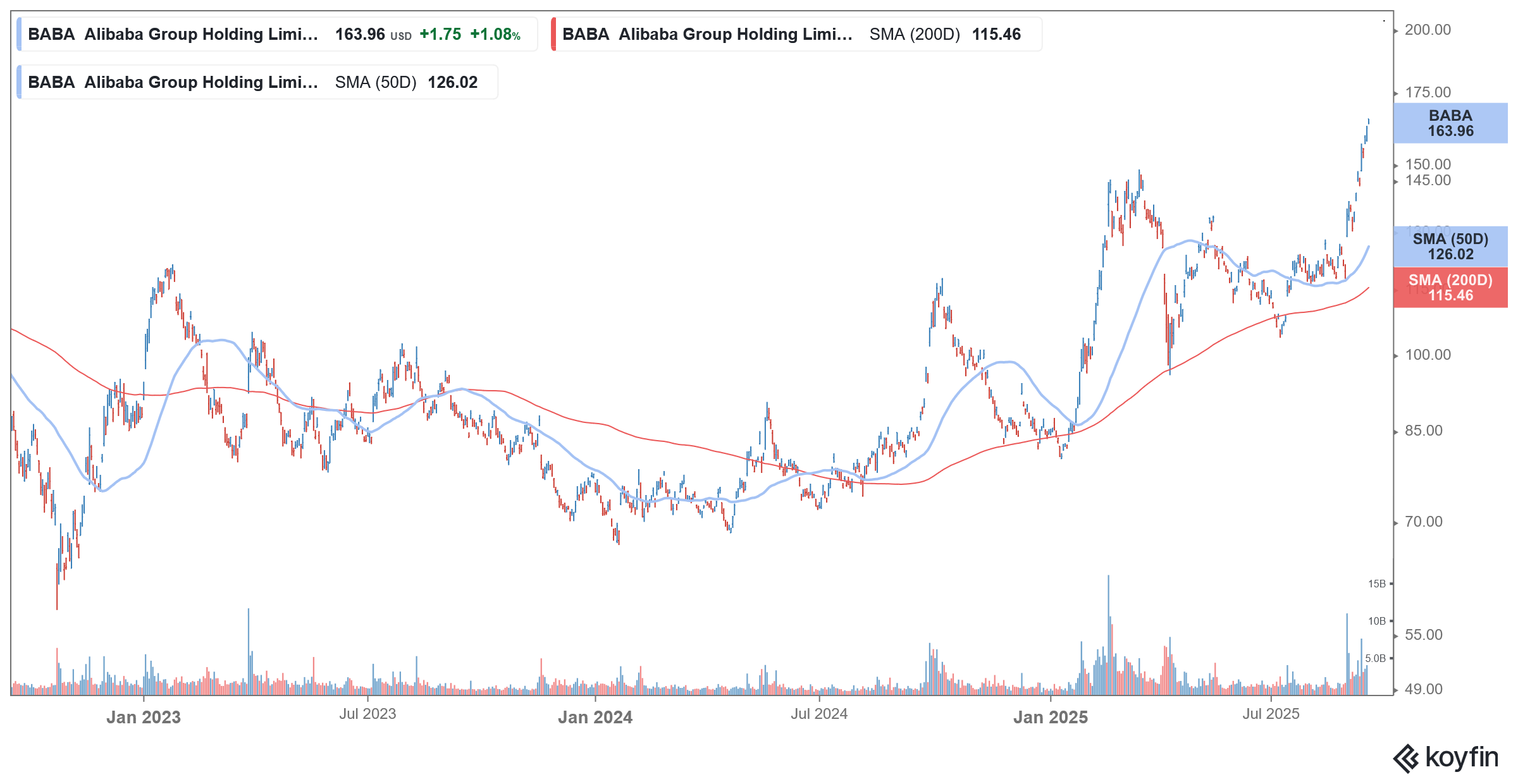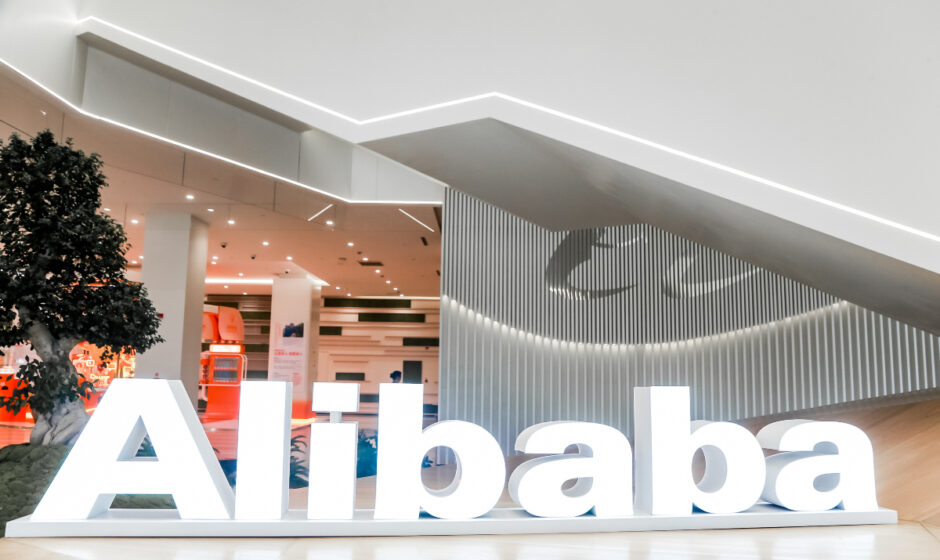Please note that we are not authorised to provide any investment advice. The content on this page is for information purposes only.
Alibaba has secured a major deal with state-owned telecom company China Unicom to supply artificial intelligence (AI) chips for a new data center. This move underscores Beijing’s accelerating drive for technological self-sufficiency and marks a major victory for domestic chipmakers amid escalating geopolitical tensions and US export restrictions.
According to reports from state broadcaster CCTV, China Unicom is building a large-scale data center in Xining, the capital of Qinghai province, with a total investment of $390 million. The data center, designed to possess a massive computing capacity of 20,000 petaflops upon completion, is a showcase of China’s commitment to using homegrown technology.
Of the nearly 23,000 domestically made AI chips currently powering the initial phase of the data center, Alibaba’s chip unit, T-Head, supplied approximately 72%. The remaining chips were sourced from other Chinese companies, including MetaX, Biren Tech, and Zhonghao Xinying, with plans to procure additional chips from Tecorigin (Wuxi), Moore Threads, and Enflame.
This partnership is particularly noteworthy in the context of the ongoing US-China technology standoff. The United States has imposed strict export controls on advanced AI chips, primarily targeting products from industry leader Nvidia, to prevent them from being used for military and national security purposes in China. This has created a vacuum in the Chinese market and spurred domestic companies to accelerate their own chip development.
Alibaba Signs Up First Major Customer for Its AI Chips
Alibaba’s AI chip, developed by its T-Head unit, has been positioned as a direct competitor to Nvidia’s H20, a less powerful chip that the U.S. company is currently permitted to sell in China. The Chinese tech giant’s chip reportedly features 96 gigabytes of memory and HBM2e, a type of vertically stacked DRAM designed for AI semiconductors, placing it in a strong position to fill the void left by restricted foreign technology.
For Alibaba, the deal with China Unicom is a significant validation of its long-term investment in chip research and development. The company has committed to investing at least $50 billion over the next three years in AI and cloud infrastructure, aligning with the national strategy to build a robust, homegrown semiconductor ecosystem. By securing a flagship client like China Unicom, Alibaba not only strengthens its position in the domestic market but also demonstrates the viability of its in-house technology on a large, commercial scale.
Alibaba Makes Progress in AI Chip
A key feature of Alibaba’s new chip is that it is being manufactured by a Chinese company. This marks a significant departure from the past, where Alibaba’s earlier AI processors were fabricated by Taiwan Semiconductor Manufacturing Company (TSMC), a firm that the US has since restricted from producing cutting-edge AI chips for China. This shift to domestic manufacturing is in direct alignment with China’s broader national strategy to build a homegrown semiconductor ecosystem and lessen its dependence on foreign technology.


Chinese Companies Are Looking for Domestic Chips
The collaboration also highlights the strategic shifts within China’s tech landscape. As a state-owned enterprise, China Unicom’s decision to favor domestic chips over foreign alternatives reflects a broader government mandate to reduce reliance on US technology. It also signals a growing preference for homegrown solutions, with a China Unicom briefing even stating that Alibaba’s AI chip offers better hardware performance than Huawei’s Ascend 910B, a chip previously championed by authorities.
While Nvidia has attempted to navigate the complex regulatory environment with less powerful, China-specific chips, the recent developments suggest that Chinese tech companies are increasingly turning to domestic suppliers. This trend, coupled with ongoing government support and a renewed focus on self-sufficiency, indicates that the battle for AI chip supremacy in China is far from over, with domestic players like Alibaba rapidly gaining ground.
China Bans Nvidia Chips
In a related but separate move, China’s government has reportedly banned its major tech companies from buying NVIDIA’s artificial intelligence (AI) chips, a move that significantly escalates the ongoing technology and trade tensions with the United States. This directive, issued by the Cyberspace Administration of China (CAC), specifically targets NVIDIA’s AI chips that have been designed to comply with previous US export restrictions.
The ban directly instructs Chinese tech giants like ByteDance and Alibaba to halt purchases and cancel existing orders for NVIDIA’s RTX Pro 6000D chip. This new measure is more stringent than earlier guidance from Chinese regulators concerning the H20 chip, which was another AI chip variant from NVIDIA tailored for the Chinese market. The RTX Pro 6000D was a more powerful chip, based on NVIDIA’s advanced Blackwell architecture, and was seen as a key product for the company’s future sales in China.
The ban also coincides with a separate, ongoing antitrust probe by the State Administration for Market Regulation (SAMR) into NVIDIA. China has accused the company of violating its anti-monopoly laws related to its 2020 acquisition of Mellanox Technologies.
Alibaba Rose After Its Q1 Earnings
Meanwhile, Alibaba seems to continue its rally, which only gained traction following the fiscal Q1 2026 earnings earlier this month.
Consolidated revenue for the quarter was $34.57 billion, a 2% year-over-year increase, which fell short of estimates. Excluding the divested businesses of Sun Art and Intime, revenue would have grown by 10% year-over-year.
The company’s adjusted net income fell 18% year-over-year to $4.68 billion, while the GAAP net income rose 76% to $5.92 billion. This rise in GAAP earnings was primarily due to mark-to-market changes from equity investments and the gain from the disposal of Trendyol’s local consumer services business.
The key highlight of Alibaba’s earnings was the strong growth in the AI business.
Alibaba Cloud, which is the company’s cloud computing arm, showed strong momentum with revenues rising by 26% year-over-year, accelerating from the previous quarter. The company harped on the triple-digit year-over-year growth of its AI-related product revenue. This marks the eighth consecutive quarter of such growth, underscoring the strong market adoption of its AI solutions.
#Alibaba #Signs #Major #Customer #Chip #War #Heats


